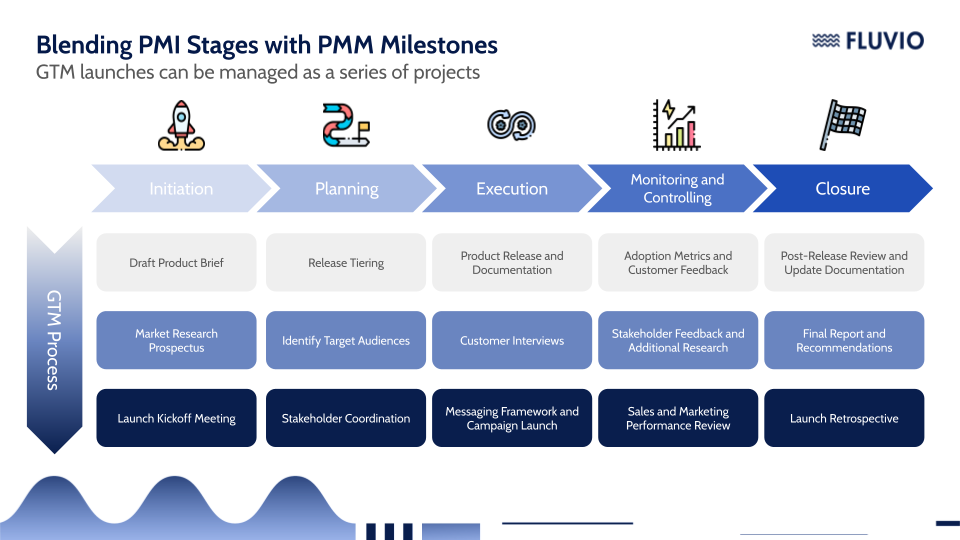The Synergy of Scope and Strategy: Integrating Project Management Principles to Elevate Product Marketing
WRITTEN BY Daniel Thai, Fluvio Senior Consultant
This is Part 1 of a three-part series exploring the intersection of project management and product marketing. We look at the structured approach of project management and how it can elevate go-to-market strategies and activities.
In the bustling world of product marketing, it's easy to get lost in market trends, customer insights, and crafting the perfect positioning. While balancing all of these responsibilities, professionals are always learning new skills to elevate their go-to-market (GTM) strategies. One such avenue, often overlooked, is the integration of project management principles, particularly those from the Project Management Institute (PMI).
At first glance, product marketing and project management may seem worlds apart; however, a deeper dive reveals several overlapping concepts between these disciplines. A PMM who can blend their product marketing skills with project management techniques can significantly elevate their go-to-market results.
The Overlapping Universe of Product Marketing and Project Management
As PMMs, our objectives — launching new products and features, initiating marketing campaigns, and driving product adoption — require a long list of elements crucial to a successful GTM strategy. While these projects are often second nature, their implementation demands an inherent sense of planning, coordination, and adaptive agility. These are the cornerstones of project management.
Along with the various other skills product marketing requires, project management techniques help ensure a more systematic, repeatable approach to execution. It offers a holistic framework to help product marketers confidently drive timely product launches that deliver genuine value.
Dissecting Roles: Product Marketing vs. Project Management
Every GTM initiative can be visualized as a series of projects. At this intersection, the core responsibilities of PMMs and PMs may differ, but their skills complement each other, creating a symbiotic relationship.
Product marketing managers (PMM) embody the voice of the market. Their insights into market dynamics, consumer needs, and the competitive landscape enable them to shape strategies that uniquely position their product. They rely on critical analysis, strategic creativity, and agility to pivot when the product landscape shifts.
In contrast, a project manager (PM) is the project’s architect. Their expertise lies in planning, executing, and supervising projects, ensuring they adhere to deadlines, remain within the agreed-upon scope, and stay on budget. Their success is measured by on-time, on-budget, and within-scope deliveries.
In many organizations, PMMs wear both hats as strategist and executor. The structure inherent in project management principles frequently mirror PMM activities: from campaign planning and stakeholder engagement to performance assessment and feedback-driven strategy refinement. This understanding paves the way for a more collaborative environment and more efficient GTM processes.
The PMI Project Stages: A Product Marketing Lens
Serving as a foundational blueprint, PMI’s project stages are a universally recognized framework to steer projects from ideation to fruition. A project lifecycle comprises five distinct stages:
Initiation: Setting the stage by defining the project’s scope and aligning stakeholder expectations
Planning: Crafting a workable plan encompassing every project facet, including setting KPIs, allocating resources, and orchestrating communication
Execution: Translating plans into actions and ensuring milestones are met
Monitoring and Controlling: Ensuring projects stay on track and making necessary adjustments if they aren’t
Closure: Evaluating the project’s success and extracting learnings to improve future projects.
The framework provided by these stages creates clarity right from the start. It sets the stage for what needs to be accomplished, by when, and with what resources.The framework also creates avenues for continuous learning and improvement. It offers an opportunity to evaluate the project’s success, gather valuable feedback – instrumental in refining strategies and approaches for future projects.
For product marketers, these stages might sound eerily familiar, albeit in a different context:
Initiation translates to aligning teams for a GTM launch with assets like a product brief and a kickoff deck. Teams should understand at a minimum the launch’s goals and timeline.
Planning involves collaborating on tactics and timelines. This could be PMM working with the product team to tier upcoming releases, and coordinating with marketing for appropriate launch support.
Execution is about spearheading GTM activities. Success starts with maintaining regular stakeholder communication to keep everyone updated and on track.
Monitoring and Controlling emphasizes analyzing performance metrics and adapting GTM tactics according to the market’s needs.
Closure is reviewing outcomes and prepping for future GTM through a project retrospective with feedback from key stakeholders.
Integrating these concepts into stakeholder relationships and day-to-day tasks stream GTM launches and add predictability into processes. Understanding and leveraging these principles facilitates a culture of collaboration and accountability that strives for better outcomes with each launch.
Bridging the Disciplines: A Catalyst for GTM Success
With the project stages as our backdrop, we can start bridging the worlds of product marketing and project management. Embracing PMI's methods brings forth several benefits:
Crystal-Clear Direction: A structured approach ensures focused execution, optimized resource utilization, and clear objectives.
Enhanced Collaboration: Principles and techniques that engender collaborative environments, and better align stakeholders towards GTM goals.
Strategic Agility: Tools and knowledge to help PMMs pivot strategies quickly based on market dynamics and the product landscape.
As we move forward in this series, we'll dive into the nuances of PMI's methodologies and explore their relevance to product marketing success. We’ll look at the Project Management Body of Knowledge (PMBOK) Performance Domains and their relevant tools and techniques. Then we’ll explore real-world scenarios and how integrating these principles can lead to better results.
Before diving into any project management applications, though, it's crucial to evaluate your current GTM processes. Without a clear picture of your strengths and weaknesses, integrating new concepts can become a shot in the dark. Start with our GTM Assessment for a comprehensive view into your PMM function today.


